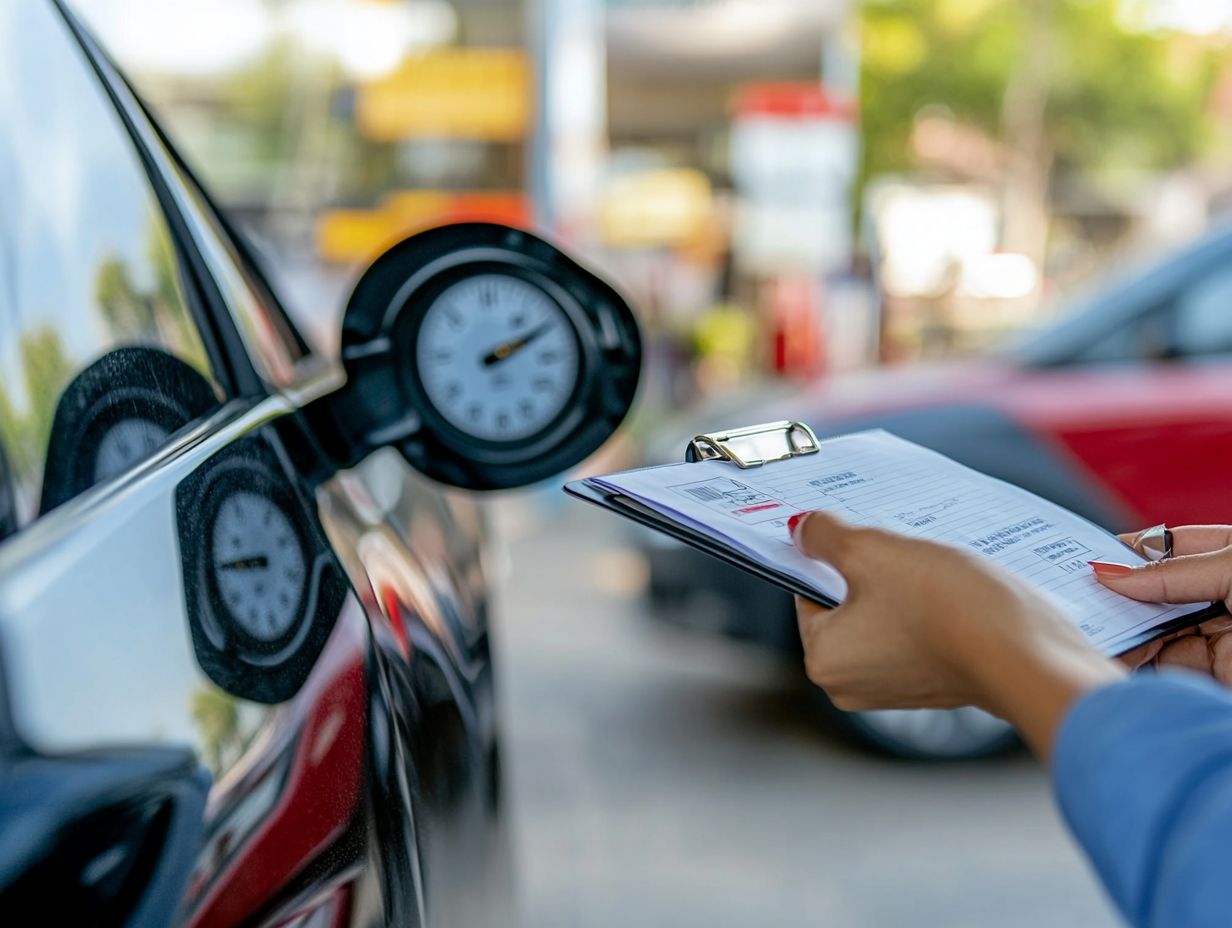How to Assess Used Car Fuel Efficiency
Fuel efficiency is not just a number it s a game changer for your wallet and the planet! Fuel efficiency is a crucial consideration in vehicle ownership, affecting both your finances and the environment.
This article delves into the meaning of fuel efficiency, examining the various factors that influence it from the type of vehicle you choose to your personal driving habits.
You ll find practical methods for calculating and enhancing your vehicle’s efficiency, empowering you to make better choices.
This guide helps you evaluate fuel efficiency when considering used cars, ensuring that you make informed decisions tailored to your needs.
Dive in as you explore the intricacies of fuel efficiency!
Contents
Key Takeaways:

- Fuel efficiency is the measurement of how far a vehicle can travel on a unit of fuel.
- Factors such as the type and condition of a vehicle, as well as driving habits, can impact fuel efficiency.
- Calculating fuel efficiency can be done through various methods and can help determine the overall cost of owning a used car.
Understanding Fuel Efficiency
Understanding fuel efficiency is essential for you, whether you re a driver or considering a car purchase, as it directly influences your fuel costs and environmental footprint.
Fuel efficiency shows how far your vehicle can go on a certain amount of fuel, typically expressed in miles per gallon (MPG) ratings. With the growing interest in fuel-efficient vehicles, hybrids, and electric cars, it’s important for you to grasp how these elements affect overall vehicle maintenance and operational expenses.
With this knowledge, you can make smart buying choices and help reduce your carbon footprint at the same time.
What is Fuel Efficiency?
Fuel efficiency measures the distance your vehicle can travel on a specific amount of fuel, typically expressed as miles per gallon (MPG).
Grasping this concept is vital for anyone looking to maximize savings at the pump while minimizing their environmental footprint. Fuel consumption hinges on a range of factors, such as engine condition, tire pressure, and your very own driving habits. For example, a well-maintained engine usually operates more efficiently, translating to optimal fuel usage.
Driving conditions, such as traffic and terrain, greatly influence fuel efficiency. By adopting smoother driving techniques and ensuring your vehicle is in peak condition, you can significantly enhance your overall fuel efficiency, leading to impressive savings over time.
Factors Affecting Fuel Efficiency
Several factors play a crucial role in determining your vehicle’s fuel efficiency, ranging from the type of vehicle and its engine condition to your driving habits and environmental conditions. By understanding these elements, you can make informed choices when selecting a fuel-efficient car that aligns with your needs.
For instance, smaller vehicles typically offer better fuel economy than their larger counterparts. Keeping up with regular maintenance like oil changes and fuel system servicing can significantly enhance both performance and efficiency.
Your driving habits, such as how you accelerate and whether you stick to speed limits, can substantially impact fuel consumption and your overall driving experience.
Vehicle Type and Condition
The type of vehicle you choose be it a sedan, crossover, or hybrid plays a crucial role in its fuel economy and efficiency.
Generally speaking, smaller vehicles, like compact cars, tend to outshine larger SUVs and trucks when it comes to fuel efficiency. This advantage stems from their lighter weight and smaller engines, which naturally consume less fuel during operation. Conversely, hybrid and electric vehicles present remarkable advancements in fuel economy, often surpassing traditional gasoline-powered models by harnessing cutting-edge technology to optimize energy consumption.
Moreover, the overall condition of your vehicle has a significant impact on its performance. Regular maintenance can greatly enhance fuel efficiency, ensuring that even those vehicles typically considered less efficient can achieve better mileage when they receive the care they deserve.
Ready to boost your fuel efficiency? Let’s dive deeper into these essential tips!
Driving Habits

Your driving habits play a crucial role in fuel consumption and overall MPG ratings. It s vital to embrace more efficient practices!
For example, quick acceleration can lead to a marked increase in fuel consumption, as your engine works harder to reach higher speeds in a hurry. Similarly, excessive idling wastes fuel unnecessarily, burning gasoline while your vehicle sits idle.
Keep a steady speed for maximum fuel savings! By doing this, you can conserve fuel and reduce wear on your vehicle.
To enhance your fuel efficiency, consider these tips:
- Gradual acceleration!
- Avoid long periods of idling!
- Utilize cruise control on highways!
Regular vehicle maintenance, such as ensuring your tires are properly inflated and your engine runs smoothly, can further boost your MPG ratings. This leads to a more economical driving experience.
Calculating Fuel Efficiency
Calculating fuel efficiency is all about measuring the distance you travel in relation to the amount of fuel you consume, usually expressed in miles per gallon (MPG).
To accurately determine your vehicle s fuel efficiency, monitor your mileage using the odometer and compare it to the quantity of fuel you fill in the tank over a designated distance. This simple practice will give you a clear picture of how efficiently your vehicle performs.
Methods for Measuring Fuel Efficiency
You have a variety of methods at your disposal for measuring fuel efficiency. It often requires careful tracking of fuel consumption against your mileage data.
One straightforward approach is manual tracking with an odometer. Simply record the fuel consumed during each fill-up alongside the distance you’ve traveled.
On the more advanced side, computer systems in your car that track fuel use can provide real-time insights into your fuel usage through vehicle sensors, offering a more automated and detailed analysis.
Monitoring your fuel consumption is essential, not just for saving costs but also for enhancing your vehicle’s performance and lifespan. By carefully analyzing this data, you can identify patterns, manage your maintenance schedules more effectively, and ultimately improve your driving habits.
This leads to better fuel economy and lower emissions, making your driving experience both economical and environmentally friendly.
Improving Fuel Efficiency
You can enhance fuel efficiency by adopting effective driving habits, committing to regular vehicle maintenance, and making informed choices when selecting your vehicle.
Tips for Increasing Fuel Efficiency
Adopting specific driving habits and performing regular vehicle maintenance can significantly enhance your fuel efficiency and lower your fuel consumption.
Ensuring proper tire pressure allows you to enjoy improved handling and optimized fuel savings! Under-inflated tires create increased resistance on the road.
Removing excess weight from your vehicle reduces the strain on the engine, ultimately boosting your fuel economy. Scheduling regular oil changes is essential; clean oil lubricates the engine s components more efficiently, contributing to overall improved performance.
Drive at consistent speeds and avoid rapid accelerations. This practice can significantly reduce your fuel consumption.
Assessing Fuel Efficiency in Used Cars

When evaluating fuel efficiency in used cars, consider several factors to guarantee optimal fuel economy and performance. To further ensure you’re making a wise purchase, learn how to evaluate a used car’s condition. Taking a comprehensive approach will help you make an informed decision that aligns with your needs and expectations.
Start tracking your fuel efficiency today for a better, more economical driving experience!
Factors to Consider
When evaluating the fuel efficiency of used cars, key factors warrant your attention: fuel economy ratings, engine condition, and overall vehicle maintenance history.
As you start buying a used car, it s essential to delve deeper into these aspects. A thorough inspection of the maintenance records will reveal how consistently the previous owner adhered to service schedules. This often highlights any potential red flags related to significant repairs or neglected upkeep.
Pay close attention to mileage readings. Lower figures typically indicate less wear and tear, enhancing fuel efficiency. Additionally, scrutinize any modifications, such as aftermarket exhaust systems or altered engine components. These can significantly impact the car’s performance and fuel consumption.
Grasping these elements will enable you to make a more informed decision.
Comparing Fuel Efficiency in Different Used Cars
When comparing fuel efficiency across various used cars, it’s essential to adopt a systematic approach. This involves meticulously evaluating their MPG ratings, or miles per gallon, alongside their overall performance to make an informed decision.
How to Make an Informed Decision
Making an informed decision when purchasing a used car requires a solid understanding of the vehicle’s fuel efficiency and its impact on your future fuel costs.
Start by diving into the miles per gallon (MPG) ratings for various models! You ll find tons of online databases ready to help. Websites like the EPA’s Fuel Economy Guide serve as invaluable resources for discerning buyers seeking specific ratings across different makes and models.
Exploring forums and user reviews can provide real-world insights into how these vehicles perform in terms of fuel economy over time. Don t miss out on reliable, fuel-efficient options available in the used car market! Local dealership resources and recommendations from mechanics can also illuminate the most trustworthy choices.
Frequently Asked Questions
1. How do I assess the fuel efficiency of a used car?

To assess the fuel efficiency of a used car, you can start by looking at the car’s fuel economy ratings, which can be found on the window sticker or online. You can also check the car’s fuel economy label, usually located in the driver’s side door jamb. Additionally, measuring fuel efficiency accurately by comparing the car’s ratings to other similar vehicles can give you a better idea of its efficiency.
2. What factors affect a used car’s fuel efficiency?
Several factors can affect a used car’s fuel efficiency, including the car’s make and model, engine size, transmission type, weight, and driving habits. Cars with smaller engines and manual transmissions tend to be more fuel efficient, while larger engines and automatic transmissions may consume more fuel. Driving habits, such as speeding and excessive idling, can also significantly impact a car’s fuel efficiency.
3. How can I determine the fuel efficiency of a specific used car model?
You can determine the fuel efficiency of a specific used car model by looking at its fuel economy ratings, which can be found on the car’s window sticker or online. These ratings, determined by the Environmental Protection Agency (EPA), are based on laboratory tests simulating real-world driving conditions. You can also find the car’s fuel efficiency label in the door jamb, which includes the car’s city, highway, and combined fuel economy ratings.
4. Are there any tools or resources available to help assess a used car’s fuel efficiency?
Yes, several tools and resources are available to help assess a used car’s fuel efficiency. The EPA’s Fuel Economy website provides a database of fuel economy ratings for all vehicles, including used cars. You can also use online calculators to compare the fuel efficiency of different cars and estimate how much you could save in fuel costs. For more detailed insights, check out how to maintain your car’s fuel efficiency, as consumer reports and reviews can provide valuable information on a specific used car’s performance.
Start your hunt for the perfect used car today! Let fuel efficiency guide your choices!
5. What are some red flags to look out for when assessing a used car’s fuel efficiency?
Watch for red flags when checking a used car’s fuel efficiency. Look for lower fuel economy ratings than similar models, frequent costly repairs, or strange noises and smells from the engine.
These issues may indicate problems that can hurt fuel efficiency. Check the car’s maintenance history. A vehicle history report can reveal its past performance and potential issues.
6. Can I improve a used car’s fuel efficiency?
Yes, you can take steps to boost a used car’s fuel efficiency. Regular maintenance, like changing the oil and air filter, keeps the engine running smoothly.
Practicing good driving habits can improve fuel efficiency. Avoid excessive speeding and rapid acceleration.
You might consider adding parts to boost efficiency. Aftermarket parts are upgrades that you can buy separately from the car manufacturer.
Explore exciting upgrades like a cold-air intake or performance chip to give your car a boost!






